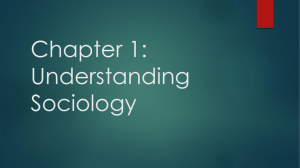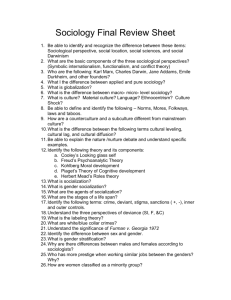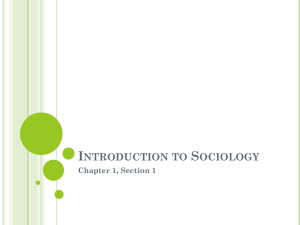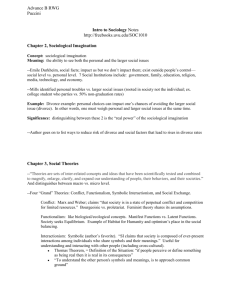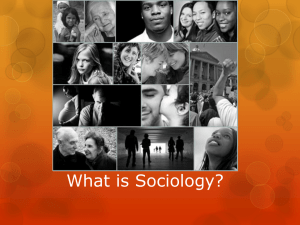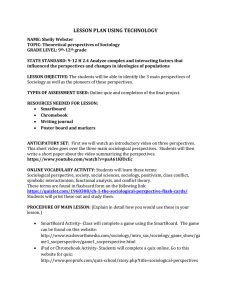Sociology
advertisement
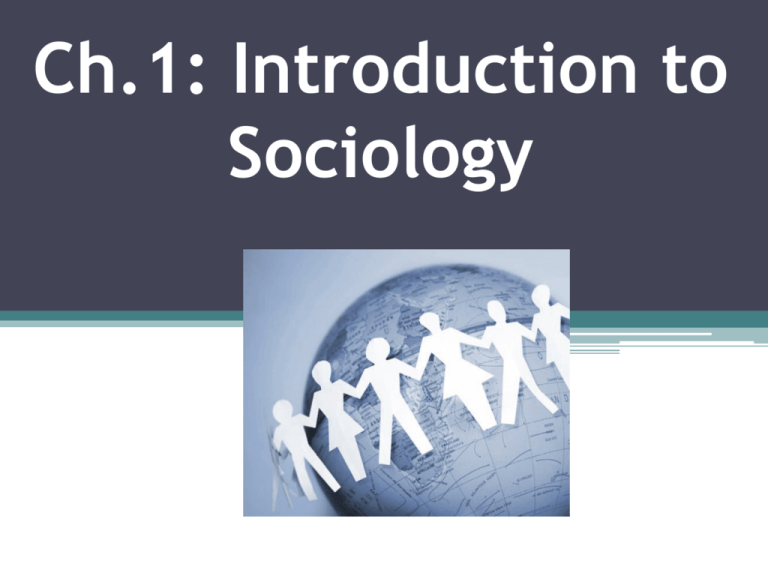
Ch.1: Introduction to Sociology 1. Sociology… a. Sociology: The “scientific” study of social structure (patterned interaction of people in social relationships). ***How Sociology Works *** Scientifically speaking, what made everything in the picture the way it is; individually and together. Individual Thing vs. Ecosystem Why/how does it all work together? *** Scientifically speaking, what made everything in the picture the way it is; individually and together. Individual Thing vs. Ecosystem Why/how does it all work together? Sociology’s “Elements” .Positivism .Social Statics .Social Dynamics .Class Conflict .Theoretical Perspectives .Mechanical Solidarity .Organic Solidarity .Verstehen .Latent Functions .Manifest Functions .Dramaturgy .Dysfunction .Rationalization .Conflict Perspective .Symbolic Interactionism .Functionalism .Self-Fulfilling Prophecy Positivism Dramaturgy Class Conflict Organic Solidarity Manifest Functions The Theoretical Perspectives Social Dynamics Self-Fulfilling Prophecy 2. The Beginnings of Sociology a. Late 19th century Europe. i. A sense of community was being lost - Industrialization and Social Disorder i.e. Farms to Factory Life, French and Industrial Revolutions. b. Intellectuals were troubled by these changes. i. Restore community and a sense of order. 3. The Sociological Perspective a. The sociological perspective is the way sociologists observe. i. Focus on social structures at the group level. b. There are different “schools”/perspectives. i. Leads to different explanations. ***Sociological Perspectives… What lens fits your view best? Functionalism? Conflict Theory? Symbolic Interactionism? May Depend on Situation… Cartoon on Pg. 30 NO! YES! ***Individual vs. Social Perspective Individual a. Young man joins gang to prove toughness. Social a. Young men join gangs because society teaches that it is masculine to do so. b. Woman divorces husband to develop her potential. b. More women divorce because of the social trend toward sexual equality. c. c. Teen commits suicide to escape depression. Teens commit suicide because peer group expectations, material possessions, and physical appearance. 4. Why Study the Group? a. Sociologists believe the sum of the group is larger than the individual components. Lead + Copper + Tin (Individual Components) = Bronze (The Sum) and/or “What is not good for the hive is not good for the bee” - Marcus Aurelius Roman emperor 5. Develop your Sociological Imagination a. Sociological Imagination: i. Ability to see the relationship between your personal life and events in society. - To make better decisions for yourself, others, or the group. - You already do this. Do finger-snap firework imagination thing from AVID.


